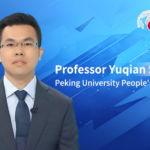
Editor's Note: Multiple Myeloma (MM) is a common hematologic malignancy, and with the emergence of immunotherapy, particularly CAR-T therapy as a revolutionary immunotherapeutic approach, the survival of patients with relapsed/refractory multiple myeloma (R/R MM) has significantly improved. From April 14th to 17th, 2024, the 50th Annual Meeting of the European Society for Blood and Marrow Transplantation (EBMT) was held in Glasgow, United Kingdom, focusing on the latest advancements in stem cell transplantation and cell therapy, driving towards better clinical outcomes for hematologic disease patients. At this conference, Professor Chunrui Li from Tongji Hospital affiliated with Huazhong University of Science and Technology School of Medicine in China presented a study comparing the efficacy of five currently available BCMA-targeting CAR-T cell products, attracting widespread attention. In this exclusive interview, Professor Chunrui Li shares the main findings of the study and provides insightful interpretations of the latest research advancements in CAR-T cell therapy for R/R MM.Current Diagnosis and Treatment Status of R/R MM and the Positioning of CAR-T Therapy in R/R MM
Although significant progress has been made in the treatment of MM over the past few decades, MM is still considered an incurable disease due to its complex biological characteristics and high heterogeneity. For patients with relapsed or refractory multiple myeloma (R/R MM), treatment goals primarily focus on achieving rapid deep remission, prolonging progression-free survival (PFS) and overall survival (OS), and improving patients’ quality of life.
Current Diagnosis and Treatment Status of R/R MM:
Traditional treatment approaches for R/R MM include chemotherapy, targeted therapy, immunomodulators, and supportive care. While these treatment modalities can temporarily control disease progression, they often fail to achieve deep and long-lasting remissions. Moreover, as the number of relapses increases and the lines of therapy escalate, patients’ treatment responses tend to diminish.
Positioning of CAR-T Therapy in R/R MM:
In R/R MM, CAR-T therapy primarily targets B-cell Maturation Antigen (BCMA), a protein highly expressed on multiple myeloma cells. CAR-T therapy is a revolutionary immunotherapeutic approach that involves modifying a patient’s own T cells to specifically recognize and attack cancer cells. Additionally, as a living drug, if CAR-T cells can persist long-term in the patient’s body and exert durable efficacy, they may reduce relapse and improve patients’ overall survival rates.
Compared to traditional treatments, CAR-T therapy offers several advantages:
1. Deep Remission: CAR-T therapy can achieve a high proportion of complete remissions (CR) or stringent complete remissions (sCR), and may even achieve sustained minimal residual disease (MRD)-negative status, which has a positive impact on long-term survival.
2. Durable Response: CAR-T cells can persist and remain active in the body, providing long-term disease control for patients.
3. Specific Targeting: CAR-T therapy reduces damage to normal cells by targeting specific antigens, potentially decreasing the toxic side effects associated with traditional chemotherapy.
In summary, CAR-T therapy holds a crucial position in the treatment of R/R MM, providing patients with a novel therapeutic approach. With ongoing clinical research, the application of BCMA CAR-T therapy is expected to expand to earlier stages of treatment.
Comparison of the Efficacy of Five BCMA-targeting CAR-T Cell Products
Our team presented a study at the EBMT conference comparing the efficacy of five BCMA-targeting CAR-T cell products using a matched-adjusted indirect comparison (MAIC) method, including Equcell, Ciltacel, Zevorcel, and Ide-cel. This method matches individual case data of drug interventions with summarized data from control interventions, allowing for efficacy comparisons in matched study populations with baseline balance.
The study results showed that, firstly, in terms of short-term efficacy: after weighting the individual case data of the FUMANBA-1 study, Equcell’s overall response rate (ORR) was superior to Zevorcel and the FDA-approved Ciltacel and Ide-cel. Additionally, Equcell’s CR rate was significantly higher than Zevorcel.
Regarding long-term efficacy: after weighting individual case data from the FUMANBA-1 study and CARTIFAN study, Equcell demonstrated a 12-month PFS rate of 82.3%, higher than Ciltacel’s 12-month PFS rate of 77%. Moreover, Equcell maintained a 100% MRD-negative rate at 12 months in the FUMANBA-1 study, higher than Ciltacel’s (from the CARTITUDE-1 study) 53.1%.
This is the first analysis comparing several BCMA CAR-T products from China and the United States indirectly, demonstrating that China’s first marketed BCMA CAR-T drug, Equcell, has superior ORR and trends toward long-term efficacy compared to the FDA-approved Ciltacel.
Characteristics of BCMA-targeting CAR-T Drug Development in China
Different CAR-T drugs have different CAR structures and development approaches. Equcell’s CAR structure was selected from numerous fully humanized alternative antibodies, with low immunogenicity to prolong its persistence in patients. In the Phase I FUMANBA-1 study, Equcell demonstrated excellent median survival time of 419 days, outperforming similar products.
Moreover, the fully humanized light and heavy chain antibodies of Equcell bind more tightly to the BCMA antigen, enhancing its tumor-killing ability. Clinical studies have also shown higher ORR and CR rates.
As a living drug, Equcell’s dissociation constant (Kd) is very close to the natural T cell dissociation kinetics in the human body: rapid dissociation facilitates efficient activation, killing, and proliferation of CAR-T cells in vivo. This not only enhances tumor-killing efficiency and deep remission but also reduces Equcell’s self-depletion, facilitating its long-term persistence in patients, reducing the risk of relapse.
Limitations and Challenges of BCMA-targeting CAR-T Therapy in Clinical Application
BCMA-targeting CAR-T therapy has shown significant efficacy in treating relapsed or refractory multiple myeloma (R/R MM) as an innovative immunotherapeutic approach. However, it still faces some challenges in clinical application:
1. Common Side Effects: CAR-T therapy may cause a series of common side effects, such as cytokine release syndrome (CRS) and immune effector cell-associated neurotoxicity syndrome (ICANS), which can be severe and life-threatening. Therefore, using CAR-T drugs with high clinical safety and tolerance, and closely monitoring and promptly intervening in these common side effects, is essential.
2. High Treatment Costs: The preparation costs of CAR-T therapy are high, and most expenses are not covered by traditional medical insurance. This limits its application in a broader patient population; as frontline clinical workers, I also advocate for more insurance coverage and urban medical insurance for CAR-T therapy.
3. Significant Process Variations: CAR-T therapy requires personalized preparation, a time-consuming and technically demanding process. The same CAR-T design may have significant differences in efficacy and safety under different processes. Therefore, we pay more attention to the registration clinical trial data of CAR-T products produced under the requirements of China’s National Medical Products Administration, which can better judge the efficacy and safety of a CAR-T drug in the Chinese population.
4. Immune Function Recovery After Treatment: CAR-T therapy may affect patients’ normal immune function, and the recovery of immune function and potential infection risks after treatment need to be monitored.
On the other hand, BCMA-targeting CAR-T therapy demonstrates tremendous potential and optimistic prospects:
1. Further Improvement in Efficacy and Safety: With continuous technological advancements and in-depth clinical trials, the efficacy of BCMA CAR-T therapy has further improved, and products have been formally approved and marketed. Our department’s first Equcell-treated patient has achieved nearly six years of CR. Moreover, as the mechanisms and risk factors of CAR-T therapy side effects are further explored, and clinical experience accumulates, the safety and tolerance of BCMA CAR-T therapy have significantly improved.
2. Expansion of Treatment Indications: Currently, BCMA CAR-T therapy is mainly used to treat relapsed or refractory multiple myeloma. In the future, with a better understanding of its mechanism of action, BCMA CAR-T therapy will be used to treat earlier stages of MM, other types of plasma cell refractory diseases, and autoimmune diseases. Our Professor Wang Wei’s study using BCMA CAR-T therapy to treat patients with myasthenia gravis not only published in internationally authoritative journals but also helped patients control the disease persistently and restore a normal and happy life.
3. Development of Combination Therapy: Combining CAR-T therapy with other treatment methods (such as chemotherapy, targeted therapy, immune checkpoint inhibitors, etc.) may produce synergistic effects and improve treatment outcomes. Researchers are actively exploring different combination therapy strategies to achieve better clinical results, significantly improving patients’ quality of life and survival prognosis.
In conclusion, BCMA-targeting CAR-T therapy has emerged as a promising immunotherapeutic approach for the treatment of relapsed or refractory multiple myeloma, with ongoing advancements and challenges. Through continuous efforts in research and clinical practice, BCMA CAR-T therapy holds great potential to significantly improve the prognosis and quality of life of patients with multiple myeloma.

Expert Biography

Chief Physician, Doctoral Supervisor
Secretary of the Party Branch and Deputy Director of Medical Affairs, Department of Hematology, Tongji Hospital, Tongji Medical College, Huazhong University of Science and Technology
Professional Focus: Immunotherapy for Hematologic Malignancies
Member of the Plasmacytic Disease Specialty Group, 11th Committee of the Hematology Branch of the Chinese Medical Association
Chairman of the Expert Committee on Blood Diseases (Hubei) of the Geriatric Disease Branch of the Chinese Geriatrics and Gerontology Society
Executive Committee Member of the Geriatric Disease Branch of the Chinese Geriatrics and Gerontology Society
Young Member of the Oncology Branch of the Chinese Medical Association
Committee Member of the Myeloma and Plasma Cell Disease Group of the 5th Committee of the Hematology Tumor Specialty Committee of the Chinese Anti-Cancer Association
Young Member of the Leukemia Alliance & Lymphoma Alliance of the Chinese Society of Clinical Oncology
Vice Chairman of the Hematology Branch of the Hubei Medical Immunology Society
Principal Investigator of Four National Natural Science Foundation Projects
Published over 20 SCI papers as first or corresponding author, including in journals such as Blood.


